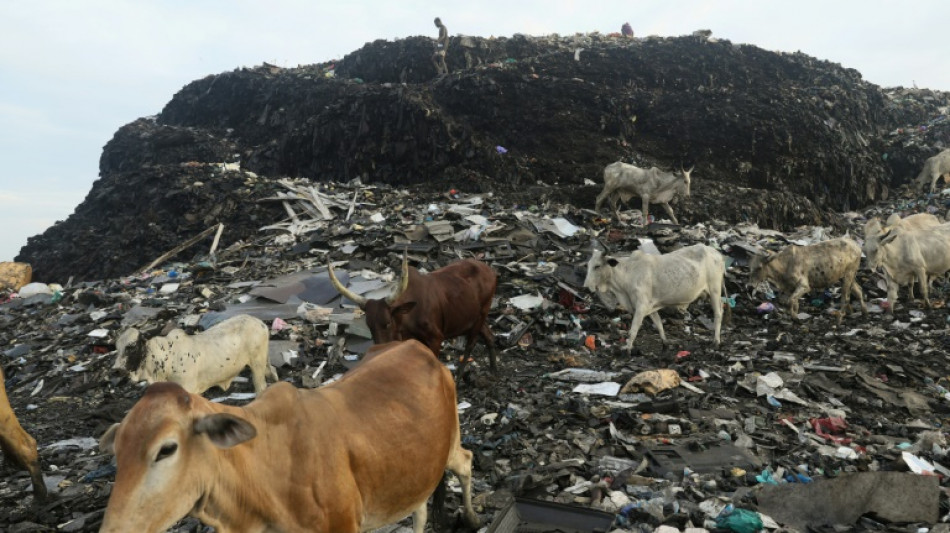
-
 Hughes looses teeth then scores Olympic gold-winning goal for USA
Hughes looses teeth then scores Olympic gold-winning goal for USA
-
Eze and Gyokeres destroy Spurs to boost Arsenal title bid

-
 Arsenal's Eze sinks Spurs again, Liverpool late show floors Forest
Arsenal's Eze sinks Spurs again, Liverpool late show floors Forest
-
Galthie praises France lock Meafou and defence

-
 'Nothing was good', says Mac Allister despite Liverpool win
'Nothing was good', says Mac Allister despite Liverpool win
-
USA defeat Canada for Olympic men's ice hockey gold, Trump celebrates

-
 EU 'expects' US to honour trade deal as Trump hikes tariffs
EU 'expects' US to honour trade deal as Trump hikes tariffs
-
'GOAT' battles to top of N. America box office

-
 South Africa thrash India to end 12-match T20 World Cup win streak
South Africa thrash India to end 12-match T20 World Cup win streak
-
Bielle-Biarrey breaks record as France beat Italy in Six Nations

-
 US says trade deals in force despite court ruling on tariffs
US says trade deals in force despite court ruling on tariffs
-
Barcelona back top of La Liga with Levante win

-
 Gu strikes gold, USA beat Canada in men's ice hockey
Gu strikes gold, USA beat Canada in men's ice hockey
-
What's behind England's Six Nations slump?

-
 Napoli rage at officials after loss at Atalanta
Napoli rage at officials after loss at Atalanta
-
Liverpool late show floors Nottingham Forest

-
 Rimac Nevera R: Beyond imagination
Rimac Nevera R: Beyond imagination
-
USA beat Canada to win men's Olympic ice hockey gold

-
 Samardzic seals comeback win for Atalanta over Napoli
Samardzic seals comeback win for Atalanta over Napoli
-
Eileen Gu switches slopes for catwalk after Olympic flourish

-
 Luce: Ferrari's ingenious electric revolution
Luce: Ferrari's ingenious electric revolution
-
Miller guides South Africa to 187-7 against India

-
 Scotland boss 'proud' of comeback Six Nations win over Wales
Scotland boss 'proud' of comeback Six Nations win over Wales
-
Iranian students rally for second day as fears of war with US mount

-
 US Secret Service kills man trying to access Trump Florida estate
US Secret Service kills man trying to access Trump Florida estate
-
Coventry 'let the Games do their magic': former IOC executives

-
 Cayenne Turbo Electric 2026
Cayenne Turbo Electric 2026
-
Sri Lanka have to qualify 'the hard way' after England drubbing

-
 Doris says Six Nations rout of England is sparking Irish 'belief'
Doris says Six Nations rout of England is sparking Irish 'belief'
-
Thousands of pilgrims visit remains of St Francis

-
 Emotional Gu makes history with Olympic freeski halfpipe gold
Emotional Gu makes history with Olympic freeski halfpipe gold
-
Impressive Del Toro takes statement victory in UAE

-
 Gu wins triumphant gold of Milan-Cortina Olympics before ice hockey finale
Gu wins triumphant gold of Milan-Cortina Olympics before ice hockey finale
-
England rout Sri Lanka for 95 to win Super Eights opener

-
 Underhill tells struggling England to maintain Six Nations 'trust' as Italy await
Underhill tells struggling England to maintain Six Nations 'trust' as Italy await
-
Alfa Tonale 2026: With a new look

-
 BMW 7 Series and i7: facelift in 2026
BMW 7 Series and i7: facelift in 2026
-
Eileen Gu makes history with Olympic freeski halfpipe gold

-
 Eileen Gu makes history with Olympic halfpipe gold
Eileen Gu makes history with Olympic halfpipe gold
-
Morocco flood evacuees mark muted Ramadan away from home

-
 Lucid Gravity 2026: Test report
Lucid Gravity 2026: Test report
-
Sri Lanka restrict England to 146-9 in T20 World Cup Super Eights

-
 West Indies wary of Zimbabwe's 'X-factor' quick Muzarabani
West Indies wary of Zimbabwe's 'X-factor' quick Muzarabani
-
Bentley: Visions for 2026

-
 Eileen Gu wins Olympic gold in women's freeski halfpipe
Eileen Gu wins Olympic gold in women's freeski halfpipe
-
First 'dispersed' Winter Olympics a success -- and snow helped

-
 Six stand-out moments from the 2026 Winter Olympics
Six stand-out moments from the 2026 Winter Olympics
-
Andrew's arrest hands King Charles fresh royal crisis

-
 Afghans mourn villagers killed in Pakistani strikes
Afghans mourn villagers killed in Pakistani strikes
-
Jeeno Thitikul brings home LPGA win in Thailand


Ghana struggling with tsunami of secondhand clothes
It takes Nii Armah and his crew of 30 fishermen hours to haul their weighty nets to shore on the bustling Korle-Gonno beach of Ghana's capital Accra.
Finally, their catch emerges -- a colossal barracuda and a less welcome bounty of bundles of discarded clothing.
Where once nets teemed with fish, they are now tangled with tonnes of clothes thrown into the Atlantic from the nearby Kantamanto market, one of the biggest secondhand markets in the world.
"Our nets are lost to the clothing from the markets," Armah told AFP. "And the fish are slipping away... our sustenance" with them.
Kantamanto market is vast, spanning over 20 acres in the heart of Accra's business district, and its stalls are dominated by used clothing and shoes from the West and China.
Its traders import a staggering 15 million garments a week, according to the OR Foundation environmental group. But roughly 40 percent of each bale ends up as waste, they say, dumped in landfills and often washed into the ocean, causing a public health crisis and harming the environment.
Ghana became the world's largest importer of used clothing in 2021, according to the Observatory of Economic Complexity (OEC) data site, with garments worth $214 million shipped mostly from China, the United Kingdom and Canada.
But the rise of fast fashion over the last two decades has caught the country in a double bind, with an even bigger wave of throw-away clothes coming from richer countries and falling prices for the Ghanaian traders as the quality drops.
- Dump exploded -
Although the business has created up to 30,000 jobs by some estimates, local NGOs say it is at the price of an "environmental and social emergency", with Ghana earning less than a million dollars in 2021 exporting the used garments it receives to other African nations.
The clothes "are mostly dumped indiscriminately because our waste treatment is not advanced", Justice Adoboe of the Ghana Water and Sanitation Journalists Network told AFP.
"When it rains, floodwaters carry the old garments and dump them in drains, ending up in our water courses and begin to cause havoc to aquatic life," he added.
The local council, the Accra Metropolitan Assembly, spends about $500,000 a year collecting and disposing of unwanted items from Kantamanto market.
But it can only handle around 70 percent of the market's waste. The rest is either burned nearby, causing air pollution, or dumped in fragile ecosystems, according to the Or Foundation.
Things got even worse when Ghana's only sanitary landfill dump exploded in August 2019 after being swamped with secondhand clothing.
The Kpone Landfill was closed after the fire, leaving one of the world's fastest-growing metropolises without a properly engineered dump.
- Ocean tentacles -
The result has been disastrous. The sand is no longer visible on some sections of Accra's beaches, with mounds of discarded textiles and plastics more than 1.5 metres (five feet) high in places.
OR's beach monitors counted 2,344 textile "tentacles" -- tangled masses of secondhand clothes -- along a seven-kilometre strip of Accra's coastline over the course of a year.
That's an average of one mass of clothing every three metres, with some tentacles dozens of metres long, containing thousands of items.
Even though the Ghanaian capital lacks the infrastructure to deal with such a deluge of waste, the industry "is experiencing significant growth", warned Ganyo Kwabla Malik, manager of the Accra Compost and Recycling Plant.
The Ghanaian government has been slow to address the secondhand clothing problem, likely due to fears of a public backlash over the loss of jobs.
It did, however, ban the import and sale of used undergarments for hygiene reasons in 1994. But the law was not enforced, except for an unsuccessful attempt to implement it by the Ghana Standards Authority in 2020.
Accra's municipal officials estimate that a new landfill could cost around $250 million, and that is without addressing the environmental damage that has already been done.
Despite the environmental damage, Malik rejected a total ban of the trade, saying the waste could be burned in incinerators to generate energy. "When you have the infrastructure that supports this kind of investment, why ban it?"
But for fisherman Armah, the government needs to act fast.
"We are pleading with the authorities to do something about this," he said. "The sea is all we have."
A.Jones--AMWN



